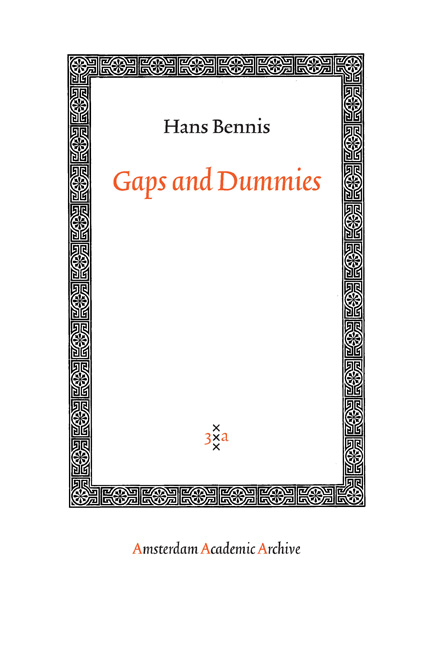Preface for the AAA-Edition
Published online by Cambridge University Press: 20 January 2021
Summary
Gaps and Dummies was originally published as a PhD-dissertation in 1986 (defense May 1986). In addition to the dissertation version, it has appeared as a book in the series Linguistic Models, volume 9, with Foris Publications (second printing in 1987). Later, the series Linguistic Models has been taken over by Mouton de Gruyter (Berlin, New York). Although the book has appeared in various versions, the text is in all cases identical to the original dissertation version, which was camera-ready produced on a Commodore- 64 computer and a daisy-wheel printer.
Gaps and Dummies has received a lot of attention nationally and internationally due to the fact that it addressed a very central theme in generative linguistics, the nature of the subject. The central questions in the book were directed towards the formal status of the subject: is the presence of a subject a consequence of structural or thematic properties?
If syntactic structure itself determines the presence of a subject position in a clause, it follows that all clauses have subject positions; given the fact that positions should be detectable, the consequence is that sentences without thematic subjects must have dummy subjects. Sentences without a thematic subject and without a lexical dummy subject must have empty dummy subjects consequently. It thus leads to the postulation of linguistic objects that have neither form nor interpretation. This view was formulated in the Extended Projection Principle, the dominant perspective in generative theory within the Government-Binding framework in the nineteen-eighties, and is nowadays still present in the minimalist framework of generative syntax, in more or less the same way.
The other perspective is that the presence of a subject is determined by independent linguistic principles. If the verb or construction requires an external argument lexically, the projection of arguments into syntactic structure makes sure that a subject is present. This subject might be lexically empty in the case of prodrop languages. Another arguable instance of subjects being present is the case in which thematic noun phrases that are not projected as subjects will be promoted to become subjects due to Case reasons. This situation occurs in the case of passive, ergative and raising constructions.
- Type
- Chapter
- Information
- Gaps and Dummies , pp. v - viPublisher: Amsterdam University PressPrint publication year: 2005



